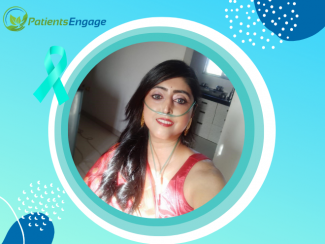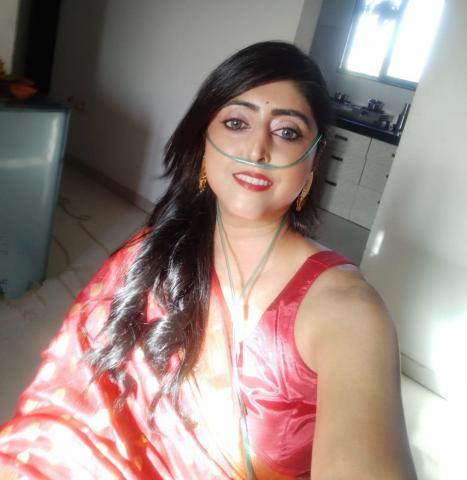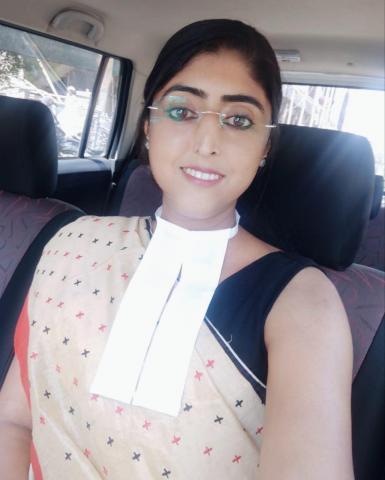
Ashwini Nalhe, 33 from Nagpur has been battling Scleroderma and a few other auto immune conditions for over 10 years now. These are rare conditions which people don’t know about, hence don’t understand. But this has torn Ashwini’s life apart in more senses than one, and yet she has learnt to pick up the pieces and move on.
Please tell us a bit about yourself and your condition.
I am an engineer and also a lawyer by profession. I have been suffering from a set of autoimmune, incurable, progressive diseases and have been kept on heavy steroids, immunosuppressant and other medications by the doctors.
Diagnosis -
- Systemic sclerosis /Scleroderma
- Interstitial Lung Disease (ILD)
- Mixed Connective Tissue Disorder (MCTD)
- Achalasia Cardia
- Pulmonary Arterial Hypertension (PAH)
Currently, there's no cure for Scleroderma, so doctors will find the treatments that work best to decrease the severity of the specific symptoms and manage or prevent additional complications.
When were you diagnosed?
I was diagnosed with Scleroderma, ILD, MCTD and pericardial effusion in 2011, at the age of 22. I used to get breathless and had exaggerated response to cold before getting diagnosed. My chest felt tight and heavy. Even after a minute’s exertion, I used to experience shortness of breath and would feel suffocated. I had severe cough and breathlessness. I had acid reflux and frequent episodes of vomiting. After a few years, breathlessness increased, skin became tight and pigmented. There was discoloration on face and changes in facial expression. Walking and climbing stairs was really tough. I used to cough a lot. Simple and day-to-day activities like bathing and changing clothes became tasks. My hands and feet used to turn blue and numb in winters. I used to get digital ulcers. Though they look tiny, digital ulcers are extremely painful. I also underwent bouts of Anemia, and experienced extreme fatigue.
I was taken to different doctors, but the disease couldn’t get diagnosed because it’s a rare disease. My lungs were already damaged with fibrosis and pulmonary function had reduced to 50% of its capacity when I finally got diagnosed in 2011. I had never heard of the term Scleroderma until then. And the doctor also failed to explain its severity. My family and I thought that it is something more than a fever and eventually, I will get rid of it with treatment. My parents thought that medical science has progressed a lot and there are medicines available even for cancer. Little did they know that there are still a few diseases which don’t have any proper treatment and medicines available.
How did you cope with it?
It was draining not only mentally and physically but also financially. Scleroderma doesn’t come alone. It brings a few other diseases with it. It took us a couple of years to understand its nature and severity. There were frequent episodes of hospitalisation in the first few years and every time some new disease would get diagnosed. The medicines would increase and there would be a few more restrictions on my lifestyle and food intake. My father was in a state of shock and in denial in the first few years.
But things started to get better, not medically but emotionally, when we started to accept it. Acceptance is the key. It makes life easier.
Is there a history of Scleroderma or anything like it in your family?
No, no one in the past 4 generations in my family had Scleroderma or any other disease similar to it.
Please describe your experience of managing the condition.
I have been on 24 hours oxygen support since past 6 months. It’s an oxygen therapy and helps to treat Dyspnea (shortness of breath). But walking around, managing day to day chores is difficult with it. Walking everywhere with oxygen concentrator is a task. Every time I go out in social gatherings, events, to work or use public transports, people stare at me. They make me uncomfortable by imposing the idea that I am different than normal in some way. Though my diseases aren’t infectious and contagious, many of them don’t want to sit next to me. They don’t want their kids to talk with me. I breathe heavily, I cough a lot due to shortness of breath. People around me get uncomfortable and feel that they might catch infection from me. But they can’t be blamed. Everyone cares about his/her own self. It is difficult to explain my diseases to everyone.
Change in facial expressions, tightness of skin, thinning of lips, shrinking nose, discoloration – pigmentation of skin had made me anxious about my looks initially. I used to feel ugly and would get conscious when someone asked me about my reduced facial movements, appearance etc. Physical changes seen with Scleroderma are often perceived to be undesirable and unattractive and can be very distressing. But I can proudly say that I have overcome it and now I feel beautiful from within.
Scleroderma, along with the other organs, has affected my esophagus. I have Achalasia Cardia which makes swallowing food extremely difficult. I hence eat in small portions. I experience acid reflux due to dilated esophagus and have to always sleep in a propped-up position.
Chronic cough, fatigue, headache, joint stiffness, Raynaud’s syndrome, sensitivity and exaggerated response to cold, shortness of breath, tight and hardened fingers, weight gain due to steroids and hypothyroidism, catching infections too often due to suppressed immunity are few other things I face on a daily basis.
As described by experts, Scleroderma is an invisible disability. We face challenges while performing tasks as basic as bathing, changing clothes, speaking, climbing stairs, sleeping horizontally, bending and swallowing, but physically we look fine and that makes people think that we are over reacting or exaggerating our problems.

How did it affect your family life?
My parents and younger brother have been standing strong with me through all the odds. We are a closely knit family and this has played an important role while accepting and managing diseases.
Initially my father was in denial. He could not accept the fact that I have to live with the diseases forever. But eventually he accepted it. Now, he helps me in managing the diseases. He also supports and motivates me to do better in career. My younger brother, who is an orthopedic surgeon, makes sure that I am happy and content. My mother is a strong woman. Whenever I am sad or on the verge of giving up, she reminds me to live life to the fullest and on my own terms.
Have you thought of marriage?
I married my childhood sweetheart in 2016. His parents were not happy with this union, especially his Dad, and the only reason for that was my disease. My husband and parents tried to convince him. They told him that the disease isn’t contagious and hereditary. I even took his parents to my doctor so that they can understand the nature of the disease and clear their assumptions about it . After the doctor’s visit, his father started avoiding calls from my parents.
After failing to convince them for a year or so, we got married, without the presence of his parents. But his extended families attended the wedding. This whole episode lowered my self esteem and I felt unwanted and undesired.
The whole episode of convincing, rejection and uncertainty lasted for one and a half year and it took a toll on my physical as well as mental health. My disease aggravated and I started feeling low and sad.
Meanwhile I conceived twice but had to undergo MTP due to health issues. These two episodes of a lot of medical procedures aggravated my Scleroderma and worsened my lung function even further. I experienced persistent cough, frequent episodes of reflux and regurgitation and skin tightening. Overall the diseases had progressed.
I was undergoing physical as well as mental trauma. I was experiencing difficulty in thinking, focusing, and making decisions. I used to feel irritated, lacked energy and slept too much. I also experienced loss of interest in sex, loss of interest in activities that I previously enjoyed. This had certainly impacted my husband as well, but he failed to confront me. He started avoiding me. He stopped talking to me and used to be on phone all the time. He ignored me completely and started hating me and I could not figure out his behaviour. I wanted to talk to him. I wanted to cry, I wanted him to hold me and tell me that this phase too shall pass, that he is with me in these difficult times. I wanted to feel loved. I wanted to feel desired. .When I failed to get his attention ,I started shouting and fighting which further annoyed him, and eventually he abandoned me.
My husband and I both failed to communicate our feelings to each other.
He thought that I was doing everything deliberately and that, it is my nature to fight, and I failed to understand the factors that had affected my physical as well as mental health. The medicines I take for Scleroderma and ILD could also be blamed for aggravating the symptoms.
People with prolonged illness are vulnerable and get impacted by the things that are otherwise considered normal. Scleroderma brings forth disabilities that are unseen. And this makes patients feel vulnerable. It lowers their self esteem and self image. A changing face, discoloration of the skin and developing weird features lower confidence. They live a life of uncertainty.They feel ugly. And they need someone to help them cope with all these emotions.
My husband completely failed to understand this and I too took a while to recognise my emotional crisis.
After a while I confronted that something is wrong with my mental health and requested him to take me to the psychiatrist. He was kind enough and took me to the psychiatrist . But within a week of the doctor’s consultation, we had a big fight and he labelled me as a mad, psychopathic woman, and after that he left me forever. He failed to understand my emotional dependency.
When the doctor got to know about it, he showed willingness to take a counselling session for both of us. Doctors also told me that the emotional crisis and the mental condition I was going through is due to the previous episodes and the disease and isn’t permanent. But it was to no avail.
What medications are you on?
I have been kept on heavy steroids, immunosuppressants, blood thinners (antiplatelet medicines),calcium –channel blockers, beta blockers , endothelin receptor antagonist drugs, phosphodiesterase inhibitors and a few supplements.
Were there any side-effects of the medicines?
Chest pain,discomfort, irregular heartbeat, vomiting, dizziness, swelling of ankles, change in vision, bone pain, darkening of skin tiredness, weight gain, upset stomach, lightheadedness when getting up as well as breaking out in a cold sweat.
Did you suffer from co morbidities? If so, how did you handle those?
Along with scleroderma, I have
- Interstitial Lung Disease
- Mixed Connective Tissue Disorder
- Achalasia Cardia
- Pulmonary Arterial Hypertension
- Hypothyroidism
How did you manage your professional life?
These diseases have impacted my professional life a lot. I am a bachelor of technology in plastics and polymer engineering. It is a sister branch of chemical engineering. But after my diagnosis of a set of autoimmune diseases, that side of my professional life shut down completely.
I later prepared for LL.B. entrance and topped the exam in Maharashtra (in OBC category). I then completed my law degree from Government Law College, Mumbai –which is one of the prestigious law schools in India and the oldest law school in Asia.
I have done specialization in Intellectual Property Law, Cyber law and Human rights.
I have also worked briefly in family courts. I run a law related website and try to spread a legal awareness in society.

What is your advice to patients in a similar situation?
As I said earlier, the key is acceptance. Accept your disease and
- Don’t think, why me?
- Take one day at a time.
- Trust your doctors.
- Do not google your diseases.
- While living a life of uncertainty, try and live it to the fullest.
What kind of specialists do you consult and how often?
I need to see pulmonologist, rheumatologist, cardiologist and dermatologist very often.
Along with this I see a gastroenterologist as and when needed.
What are the least understood aspects of Scleroderma?
That Scleroderma is incurable, at least to this date. But it can be managed and the progression speed can be arrested with the right treatment.
Has it been difficult emotionally to cope with your condition?
When a person suffers from any prolonged, chronic illness, it surely takes a toll on his mental health. There are a few medicines too which aggravate emotional imbalance. I experience mood swings, loss of interest, sadness, irritability, anxiety, fear, social withdrawal, over eating, low energy and uncontrollable emotions.
But following things help me in managing these symptoms
- Practicing meditation
- Eating well
- Driving
- Spending time with nature
- Getting enough sleep
How has your family supported you?
My family members have been supporting me not only emotionally but also financially. The treatment and medicines for Scleroderma and ILD are very expensive.
As told to Moyna Sen






